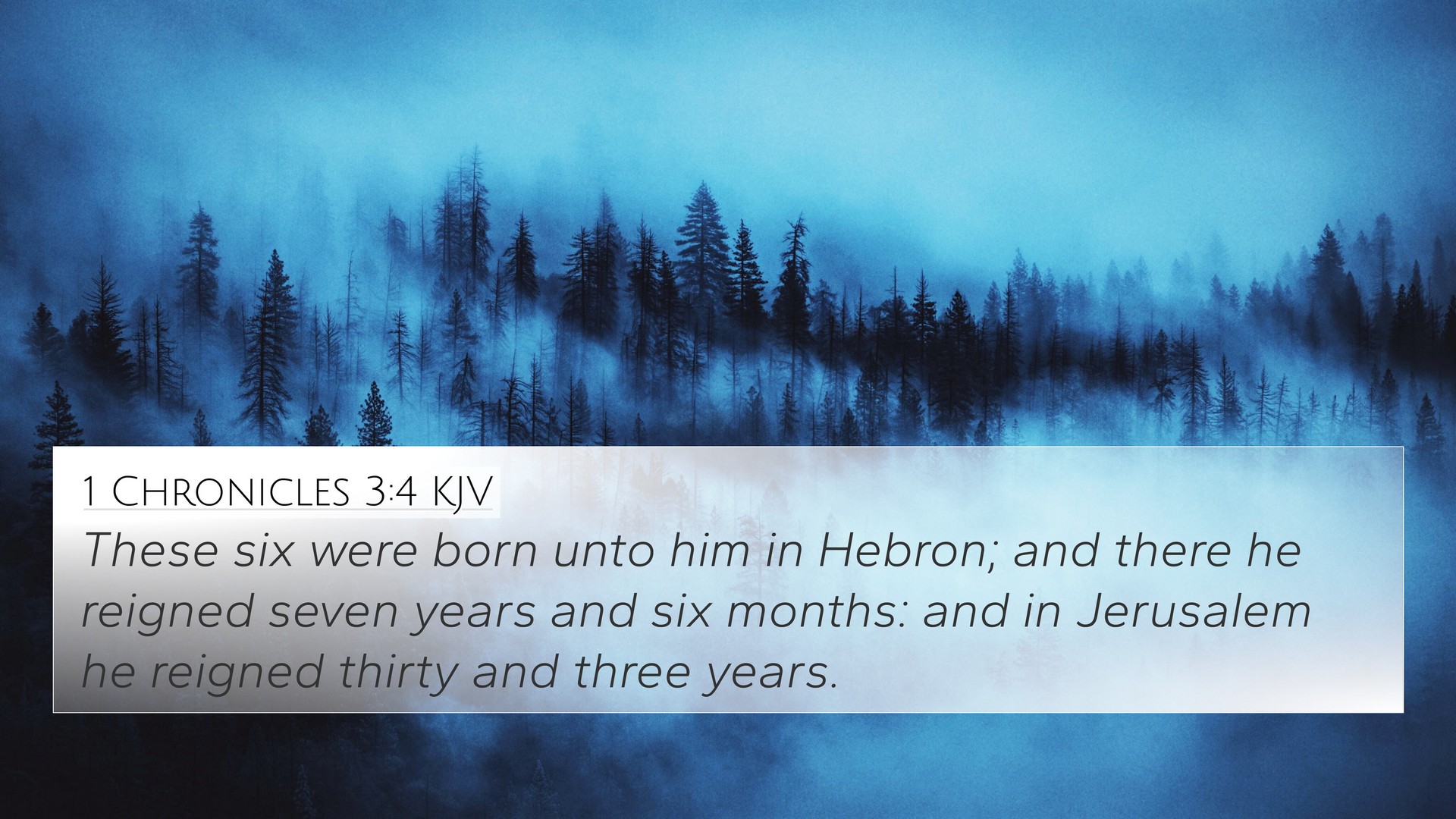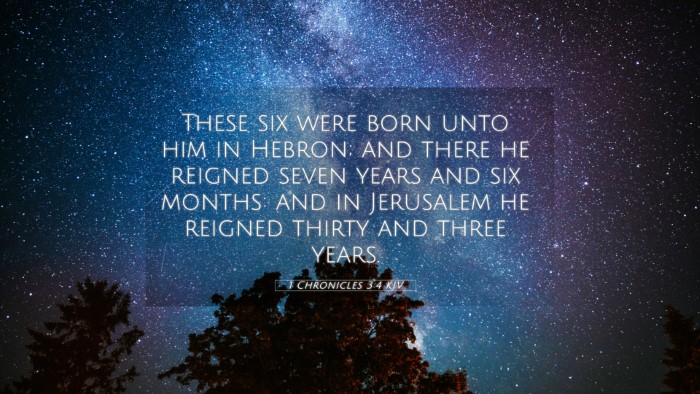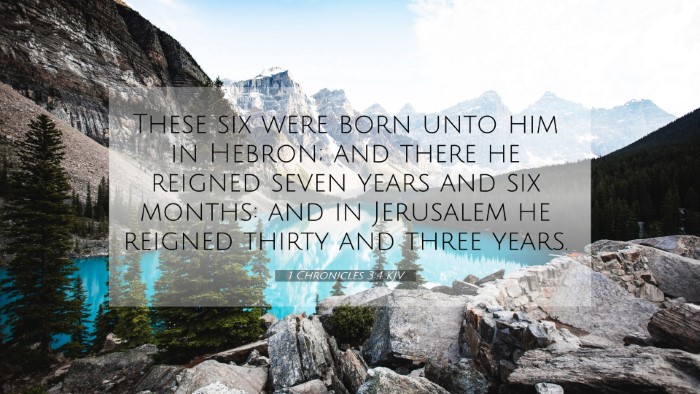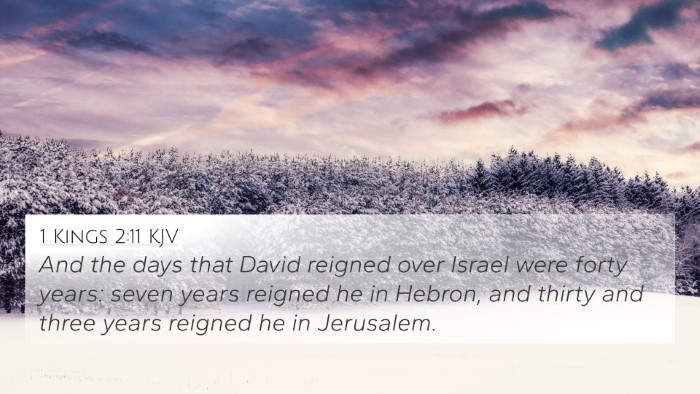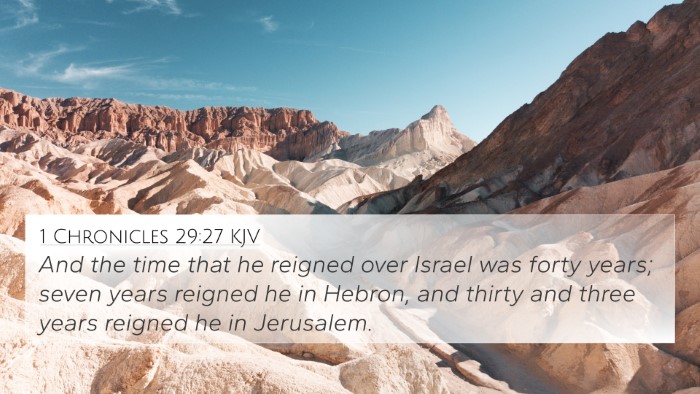Understanding 1 Chronicles 3:4
Verse: 1 Chronicles 3:4 - "These six were born to him in Hebron; and there he reigned seven years and six months: and in Jerusalem he reigned thirty and three years." (KJV)
Verse Meaning and Interpretation
This verse highlights the royal lineage of David, indicating the number of sons he had during his reign in Hebron and later in Jerusalem. The reference to the specific durations of his reign at both locations is significant as it underscores the establishment of David's kingship and the significance of Jerusalem as the national capital.
Insights from Public Domain Commentaries
-
Matthew Henry:
Henry emphasizes the fulfillment of God's promise to David regarding his dynasty. He notes that the emphasis on the two locations signifies the transition from a local king to one who would reign over all Israel. The mention of his sons also illustrates the formation of a royal household, which is vital for the continuity of his lineage.
-
Albert Barnes:
Barnes points out the historical context of this verse, noting that David’s reign in Hebron was marked by division. During this time, his sons were born, establishing a future generation that would play crucial roles in Israel's history. His transition to Jerusalem was a pivotal moment, symbolizing unity among the tribes under a singular king.
-
Adam Clarke:
Clarke elaborates on the significance of Jerusalem as the chosen city of God. He connects the legacy of David's reign not just to his offspring but also to the spiritual leadership that would stem from it, culminating in the Messiah's lineage through David.
Cross-References for 1 Chronicles 3:4
This verse interconnects with several other biblical passages, illustrating themes of kingship, lineage, and divine promise. Here are some relevant cross-references:
- 2 Samuel 5:5: "In Hebron he reigned over Judah seven years and six months; and in Jerusalem he reigned thirty and three years over all Israel and Judah."
- 1 Samuel 16:1: The anointing of David, signifying God's choice for the monarchy.
- 2 Samuel 7:12-16: God’s covenant with David, promising that his descendants will reign forever.
- Psalm 89:3-4: Reflects God's promise to establish David's lineage.
- Matthew 1:6: Lineage of Jesus, emphasizing the fulfillment of the Davidic promise.
- Hebrews 7:14: Acknowledges Jesus' descent from Judah, connecting to David's lineage.
- Luke 1:32-33: The announcement of Jesus' eternal reign, linking back to the Davidic covenant.
Thematic Connections
This verse is rich in themes of leadership, God's covenant, and divine providence. Its implications are deepened when viewed through various lenses of the Biblical narrative:
-
Leadership: David's reign models the characteristics of a God-chosen leader. His time in Hebron represents a phase of testing and preparation before assuming full power in Jerusalem.
-
Divine Covenant: As God promises David an enduring dynasty, this assurance underscores the centrality of covenant themes that span both the Old and New Testaments.
-
Lineage and Fulfillment: The genealogical records found in the Gospels affirm the significance of David's lineage and its fulfillment in Christ, showcasing God's faithfulness through generations.
Conclusion
1 Chronicles 3:4 serves not only as a historical account but also as a theological reflection on God’s faithfulness and enduring promises. Understanding this verse in connection with others enhances its significance, revealing a narrative of hope, leadership, and divine purpose within the Biblical text.
Further Study
For deeper understanding, consider utilizing tools for Bible cross-referencing, such as:
- Bible concordance
- Bible cross-reference guide
- Comprehensive Bible cross-reference materials
